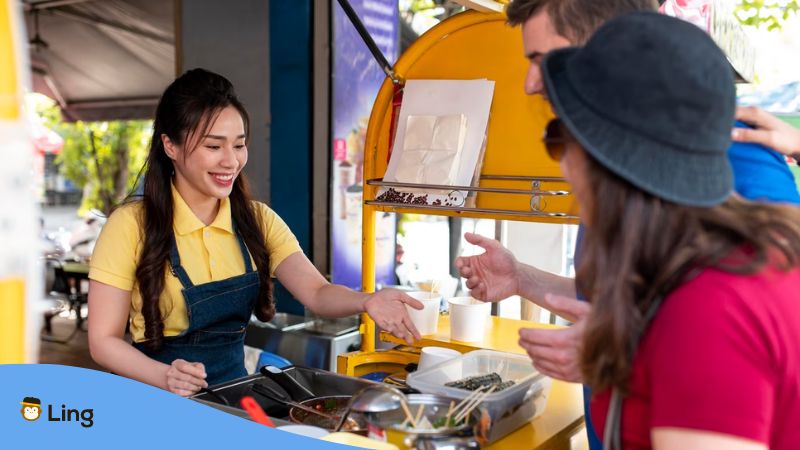Have you ever thought about the power of a polite phrase? These aren’t just everyday phrases. They’re keys to engaging with the vibrant world of Cantonese speakers.
And what’s more, these phrases come with an added bonus!
They’re more than mere words in the Cantonese language.
They’re a glimpse into the unique blend of tradition and modernity that shapes Cantonese etiquette.
So, ready to build some linguistic bridges and unlock the cultural nuances behind polite Cantonese phrases?
The Foundation: Understanding Basic Cantonese Phrases
Starting on the right foot with Cantonese is all about grasping the essentials.
Wouldn’t it be great to greet a local in their tongue or express gratitude with a hearty “Thank you”? You bet!
These basic phrases are our first building blocks. They’re the openers to real conversations and the foundation for making connections.
Essential Everyday Phrases
In Cantonese, to say “Hello,” you would say “你好” (nei5 hou2).
It’s simple and friendly.
On parting, express your goodbyes with “再見” (zoi3 gin3).
Want to sprinkle your chat with courtesy?
Remember these two: “唔該” (m4 goi1) for “Please” and “多謝” (do1 ze6) for “Thank you.”
Isn’t it amazing how four short phrases can light up an entire conversation?
Common Courteous Phrases In Various Settings
Imagine you’re at a bustling restaurant in Hong Kong.
As your friend digs into their meal, you lean in and say “食得唔好味” (sik6 dak1 m4 hou2 mei6), translating to “Enjoy your meal.”
Just like that, you’ve added warmth to your moment.
Now, let’s switch settings.
You’re at work and need to ask a colleague for help.
A polite “幫幫手呀” (bong1 bong1 sau2 aa3), meaning “Could you please…” works wonders.
Respect, after all, makes the professional world go round.
And what about social interactions, like meeting someone new?
A charming “好高興認識你” (hou2 gou1 hing3 jing6 sik1 nei5), meaning “Nice to meet you,” will surely put a smile on their face.
Simple and basic words have a profound impact.
Now that’s the power of polite Cantonese phrases in different contexts.

Deepening Your Understanding: Advanced Polite Phrases In Cantonese
Let’s move beyond the basics. The more you understand the finer nuances of the language, the closer you’ll get to sounding like a native speaker.
Expressing Modesty And Humility
Let’s paint a picture. Someone compliments your Cantonese.
A simple “thank you” won’t quite cut it.
Instead, a true Cantonese speaker might respond with “我仲有好多要學” (ngo5 zung6 jau5 hou2 do1 jiu3 hok6), meaning “I still have a lot to learn.”
See how this subtly deflects the compliment? That’s modesty, Cantonese style.
But wait, there’s more!
Consider phrases like “唔掂” (m4 dim2), meaning “not good enough,” or “還好” (waan4 hou2), meaning “it’s okay.”
These little expressions show humility and are great ways to navigate a range of social interactions.
Respectful Communication
In Cantonese and Chinese culture, how you speak to elders and superiors really matters.
To address an elder, add “阿” (aa3) before their name. It’s a small addition but shows a great deal of respect.
In a professional setting, “可唔可以幫我” (ho2 m4 ho2 ji5 bong1 ngo5) is a polite way of asking for help, translating to “Could you help me, please?”
And when it comes to giving advice or disagreeing, consider saying “我諗你可能會” (ngo5 lam2 nei5 ho2 nang4 wui5), meaning “I think you might…”
This tactful way of offering an opinion keeps the communication respectful.
Reading The Cultural Context: Politeness In Cantonese Culture
Phrases are just half the story in Cantonese politeness.
The other half? It’s all about cultural context.
Let’s unwrap these cultural elements and see how they color the language.
The Importance Of ‘Face’
In Cantonese culture, ‘face’ or ‘面’ (min6) is more than just a physical feature.
It represents a person’s reputation, dignity, and respect within the community.
Cantonese people try to ‘save face’ or ‘保面’ (bou2 min6), maintaining their image through polite speech and behavior.
For instance, someone might respond to praise by downplaying their achievement.
Indirect Communication
Straight talk may not always be the best strategy in Cantonese interactions.
Ever thought about that?
To avoid confrontation, Cantonese speakers often opt for indirect expressions.
It’s all about preserving harmony.
So, how do you say “no” without sounding rude?
Try “我會考慮一下” (ngo5 wui5 haau2 leoi6 jat1 haa5), meaning “I will think about it.”
It’s a polite and non-confrontational way of expressing disagreement or refusal.
A roundabout route, perhaps, but one that keeps the conversation smooth and respectful.

Polite Phrases In Cantonese: Practical Applications
Theory, check. Context, check. Now, how about putting all these polite phrases into action?
It’s time to practice in various scenarios.
Scenario 1: Street Market Bargaining
Imagine being at a bustling Hong Kong street market. The vendor tells you the price is “壹佰蚊” (yat1 baak3 man1), one hundred dollars.
You think it’s a bit steep and want to negotiate.
Instead of being too direct, say “可以平D嗎?” (ho2 ji5 ping4 D maa1), which translates to “Can it be cheaper?” Smooth sailing, isn’t it?
Scenario 2: Declining Food At A Friend’s House
Next, picture being at a Cantonese friend’s house for dinner.
Their parents serve a dish you’re allergic to. Let’s say it’s pork. No worries!
Simply say, “唔好意思,我唔食豬肉” (m4 hou2 ji3 si1, ngo5 m4 sik6 zyu1 juk6), meaning “Sorry, I don’t eat pork.”
You’ve managed to decline while being polite. Pretty easy, right?
Scenario 3: Apologizing For Being Late
You’re running late for a meeting with a Cantonese colleague.
When you finally arrive, don’t forget to say “對唔住,我遲左” (deoi3 m4 zyu6, ngo5 chi4 zo2), meaning “Sorry, I’m late.”
A simple phrase that shows respect for their time.
Scenario 4: Complimenting A Friend’s Outfit
You’re meeting a friend who’s dressed exceptionally well today.
It’s the perfect time to compliment!
Try saying “你嘅衫好靚呀!” (nei5 ge3 saam1 hou2 leng3 aa3), translating to “Your shirt is really beautiful!”
You’ve just brightened their day with your polite remark. It’s as simple as that.
Scenario 5: Politely Requesting Help
Imagine needing help with your luggage at a Cantonese-speaking airport.
Approach a fellow traveler and say, “唔好意思,你可唔可以幫我拎下行李?” (m4 hou2 ji3 si1, nei5 ho2 m4 ho2 ji5 bong1 ngo5 ling1 haa6 hang4 lei4?), meaning “Excuse me, could you please help me with my luggage?”
Voilà, you’ve asked for assistance in a polite way!

Tips For Practicing Cantonese Polite Phrases
It’s not just about knowing the phrases. It’s also about applying them in our daily conversations.
Don’t worry if it feels a bit daunting at first. Here’s how we can make it work:
Effective Ways To Incorporate Polite Phrases Into Daily Conversation
To start off, one efficient way is by putting these phrases in your daily Cantonese vocabulary.
Who said you couldn’t practice with non-Cantonese speakers?
Slip in a polite Cantonese phrase while conversing with your friends.
They might be surprised but also impressed!
Next, when watching a Cantonese movie, or listening to a podcast or song, keep an ear out for these phrases.
Can you spot any polite expressions?
Write them down, and try using them in your own sentences.
Before you know it, these polite phrases will feel second nature.
Finally, try creating scenarios in your head similar to the ones we discussed earlier.
What would you say in these situations?
Visualizing and mentally practicing the dialogue can reinforce these phrases in your mind.
Resources For Further Learning
We’ve laid the foundation, but the learning doesn’t stop here! Wondering where to go next?
For beginners, Cantonese language learning apps can be a good start.
Some offer Cantonese lessons that specifically focus on polite phrases and cultural context.
Engaging with Cantonese media like movies, TV shows, and music can also give you a wealth of real-life examples of these polite phrases in action.
Ever heard of Cantonese pop (Cantopop)? Give it a try!
For a more interactive experience, language exchange programs can be beneficial.
You’ll find native Cantonese speakers eager to teach you their language and learn yours.
It’s a win-win!
More Polite Phrases In Cantonese
Who’s ready for a bonus round? We’ve covered a lot of ground, but there’s always more to discover regarding polite Cantonese expressions.
Here’s an additional list of phrases to help elevate your Cantonese speaking skills.
Try using these polite Cantonese phrases in your everyday conversations and see how they enhance your language skills and confidence.
Remember, the journey of learning a language is a marathon, not a sprint.
Take your time, and don’t rush the process.
Learn Polite Cantonese Phrases With Ling!
After such an engaging discussion, you might think, “What’s next?”
That’s the beauty of learning languages!
There’s always something new to discover, especially with a language as rich as Cantonese.
Now, here’s the exciting part.
Want to take your Cantonese language learning experience to the top? Look no further than the Ling app!
We’re not just about Cantonese. The Ling app is all you need to learn over 60 different languages.
It offers a variety of interactive activities, quizzes, and even real-life dialogues to enhance your learning experience.
Learning polite Cantonese phrases is just the tip of the iceberg.
With the Ling app, you can go deeper into Cantonese grammar, vocabulary, and even culture.
Are you ready to make learning Cantonese fun and efficient?
The Ling app is available on Google Play and the App Store.
Just one click, and your journey to mastering Cantonese and other languages begins!



































































